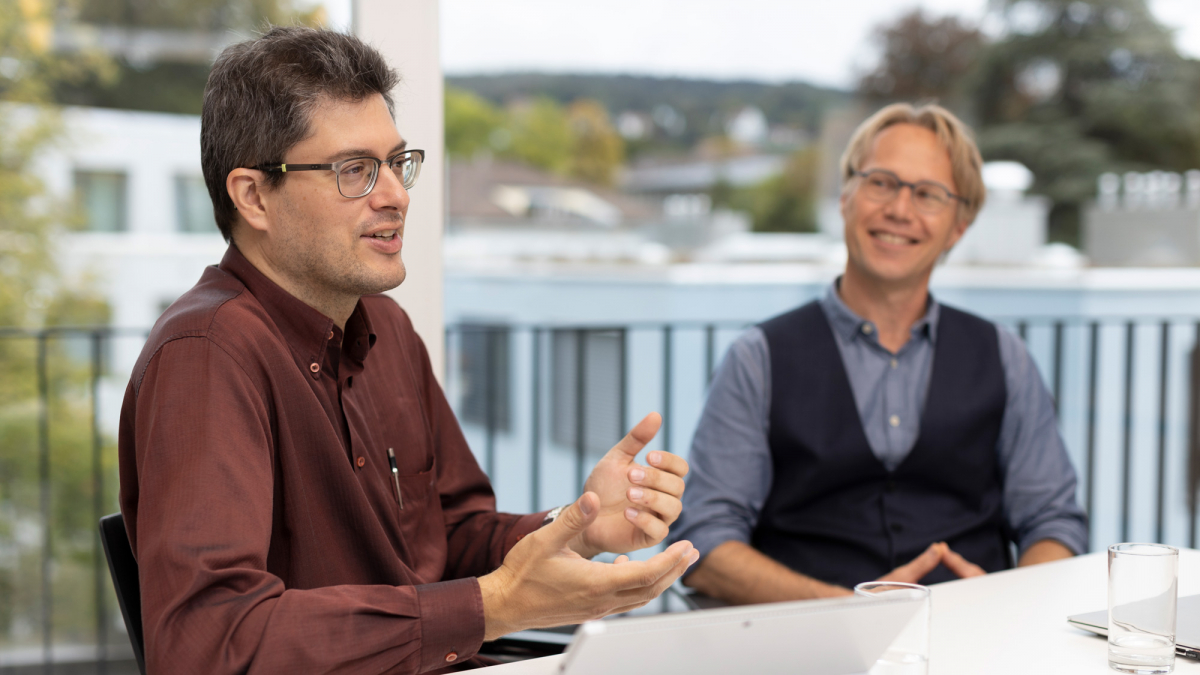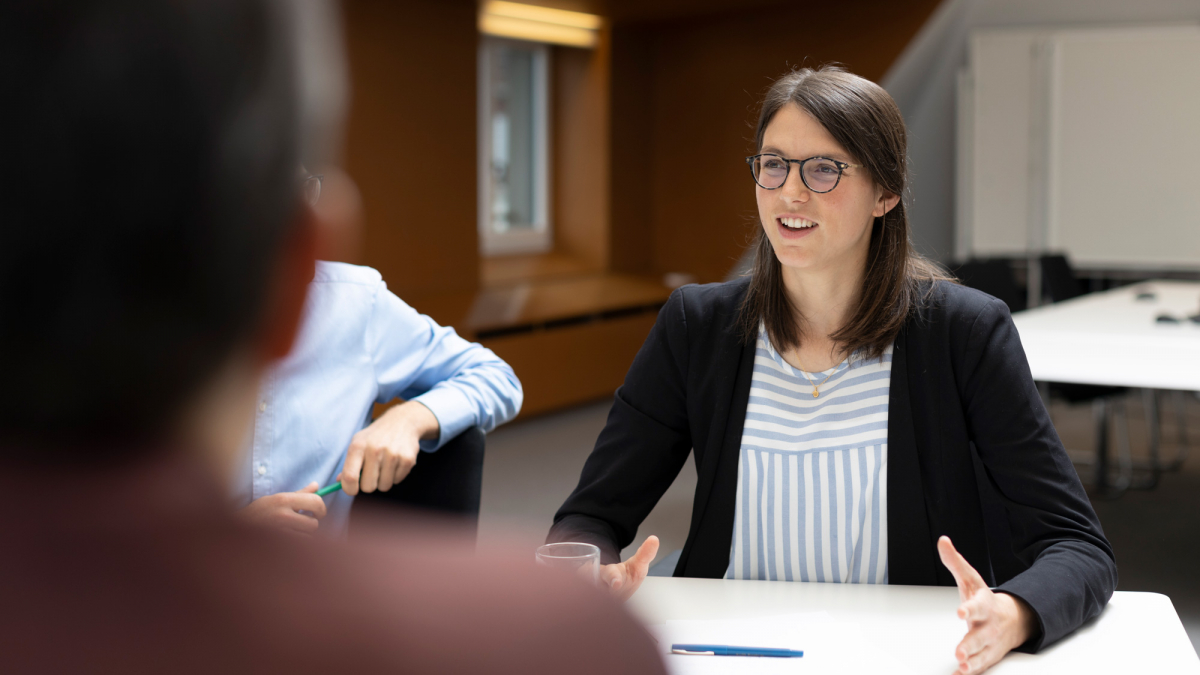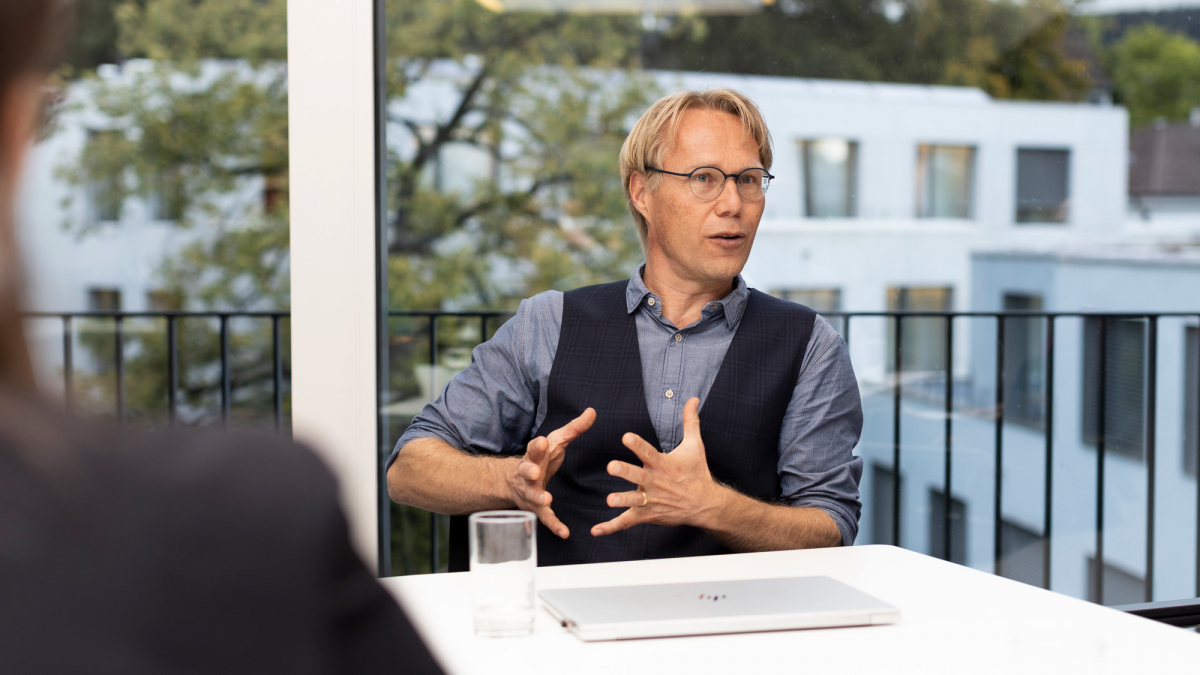EBP employees play an active role in academia
A number of our employees teach and conduct research at various academic institutions throughout Switzerland. What is their motivation for being involved in academia? What are the challenges they face as professionals in private enterprise? And what are the benefits of their engagement in both worlds. We sat down with our colleagues Peter de Haan, Lukas Beck, Leonie Dörig and Marcel Lehner to find out all about it.
Why have you chosen to take an active teaching role in academia?
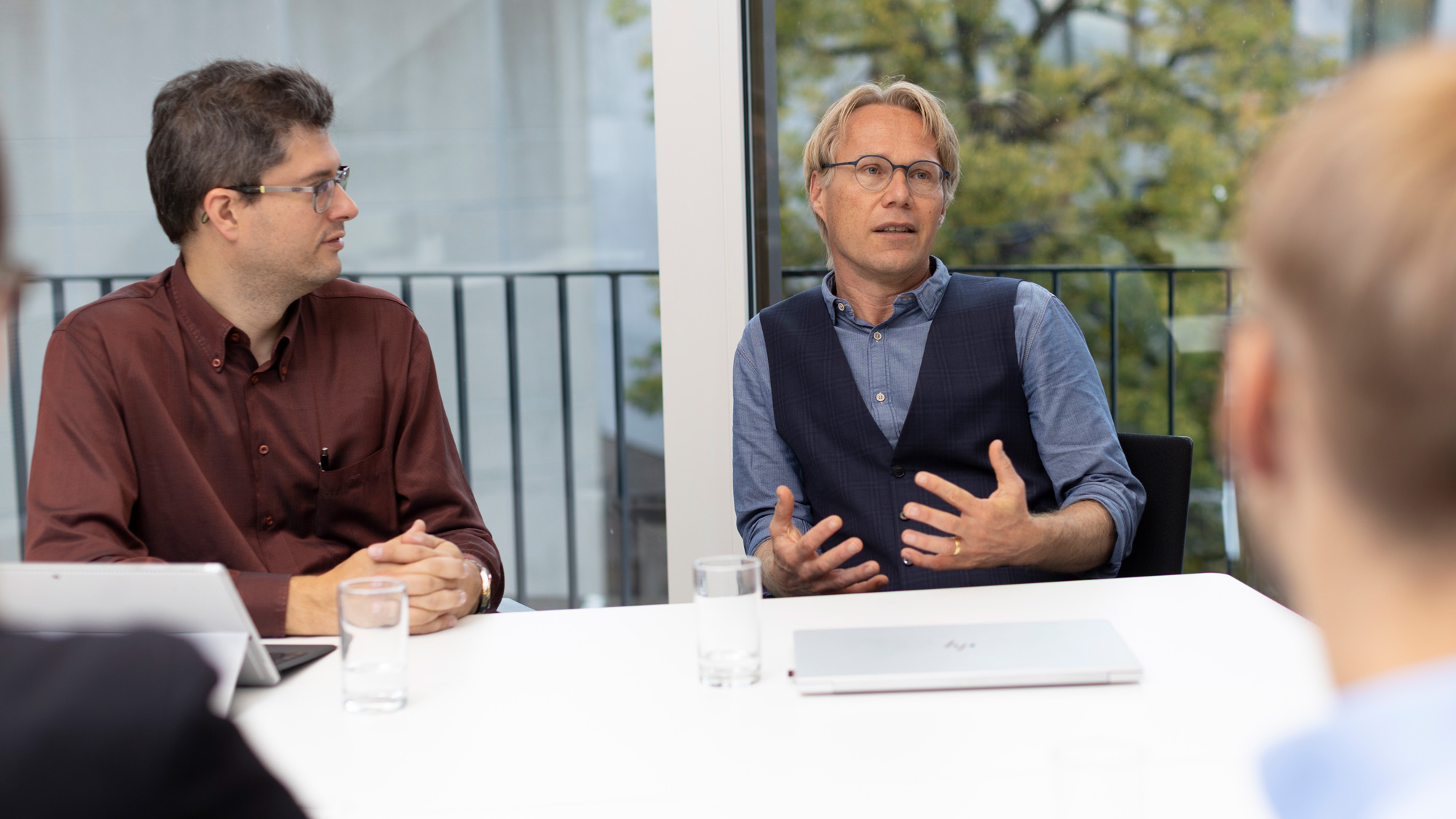
Peter de Haan: I regard it as a privilege to teach and learn from young people. They’re highly motivated and determined to do no less than change the world. That fuels my own motivation and keeps me young. I’m also interested, of course, in keeping abreast of the latest developments in research. And, not least, my ties to academia help us to recruit new talent. Many of the good students I encounter along the way wind up submitting their applications directly to me.
“Young people are motivated and determined to change the world. That fuels my own motivation.”
Marcel Lehner: I agree wholeheartedly. We all need to develop continually as professionals. On the other hand, there is much that we can pass on to the students, especially in the context of helping them prepare for their certification exams, a context, by the way, that also helps me expand my range of contacts.
Leonie Dörig: Another aspect is personal development. As a research fellow at the Zurich University of Applies Sciences (ZHAW), I was given an opportunity to develop a lecture on the subject of energy law. It was a challenging assignment, but also one that sharpened my own understanding of the material. Moreover, it gave me an opportunity to improve my teaching skills. I asked myself: How can I best convey the complex issues involved? And how can I make my lecture more exciting and elicit an enthusiasm for the topic among my students? To be honest, I did need to overcome a bit of anxiety in the beginning, especially when many of the students were older than me. I’ve learned a lot since then and I’ve come to feel far more poised and self-confident.
“I also like the challenge of being a good teacher.”
Lukas Beck: I know what you mean. I also like the challenge of being a good teacher. Where I work in adult education, my aim is to spark an interest in the material and to guide my students along a shared path of inquiry, despite our different points of departure. To accomplish this, I find it helpful to spend a good amount of time getting to know my students at the beginning of a course, so I can take account of their different backgrounds.
Peter de Haan: That’s an important point. The demand for high-quality instruction is far greater in continuing-education programs because the participants will have already achieved a degree of expertise in their own fields. I think it’s therefore essential to be transparent about where your own expertise lies and what fields you may be less familiar with. That helps to create an atmosphere of mutual respect. My work in continuing education also has the advantage of giving me direct access to prospective clients.
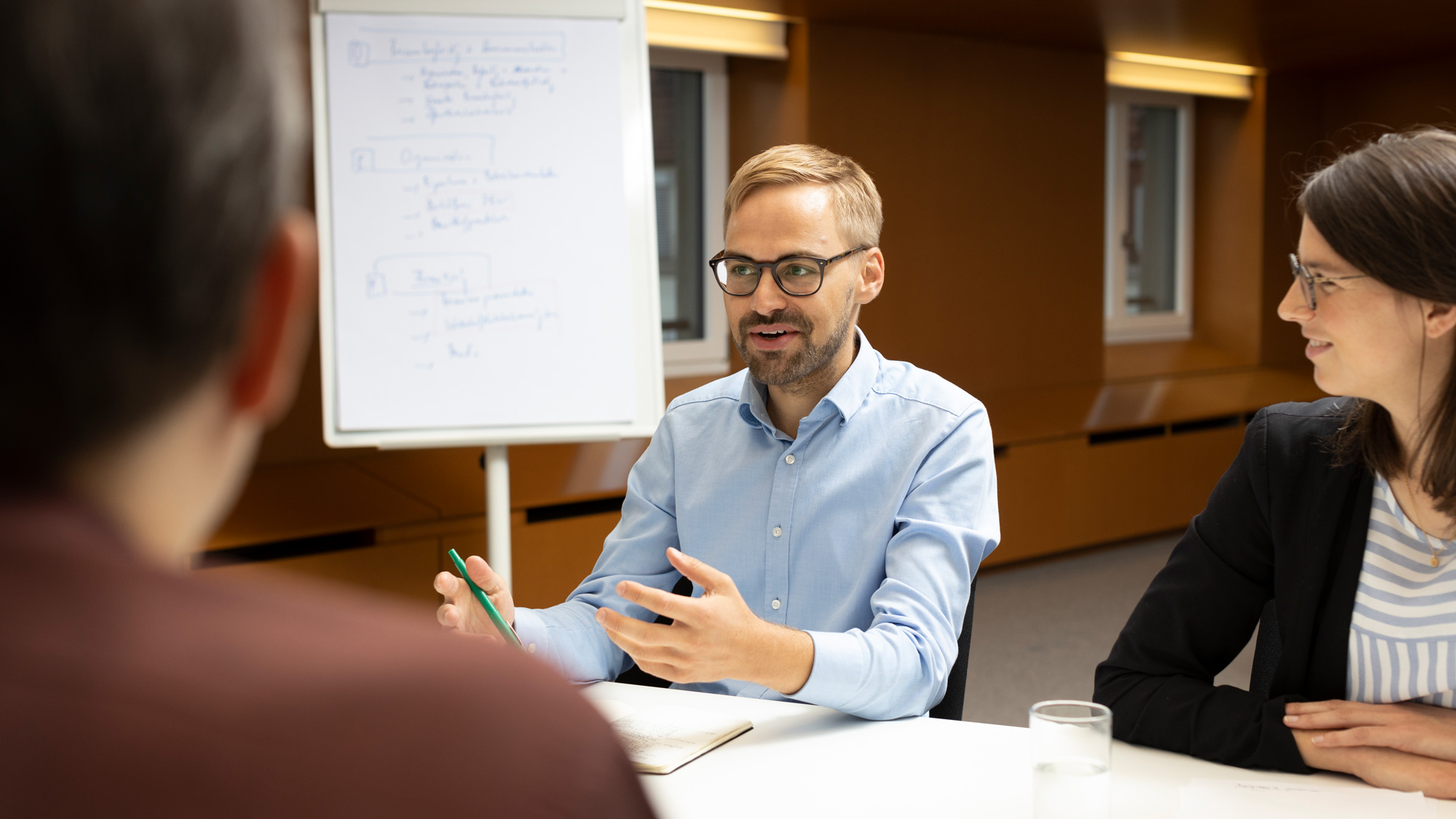
What are the challenges that come with your dual roles?
Marcel Lehner: The two roles can be difficult to manage. My work in academia corresponds roughly to that of a teacher with a 10% workload. That’s in addition to my full-time job at EBP. I definitely need to be well-organized to make it possible.
Peter de Haan: Organization is the key word. My work at school sometimes involves being present at short notice for important non-scheduled events, for instance, in the run-up to final examinations. Sometimes these obligations collide with my project work or business meetings. At the end of the day, it’s often an organizational challenge to meet all of my obligations.
What can companies do to support their employees who also work in academia?
“It can be difficult to manage work obligations while engaged in research projects.”
Leonie Dörig: I need a lot of latitude when it comes to managing my time. And I’m afraid a rigid schedule would make it impossible for me to continue to work in academia. That’s why I’m so grateful to EBP for giving me the flexibility I need. Still, it can be difficult to manage work obligations while engaged in extensive and time-consuming research projects. While I can prepare for a lecture on the fly, as it were, research projects sometimes require several consecutive days of on-site availability. This may well collide with my client projects.
Peter de Haan: I think this is the crux of the problem. Conflicting obligations can force new employees to turn away from their post-graduate involvement in academia one or two years after graduating. It’s a time when they’re highly committed to their professional careers. So they refrain from pursuing their academic endeavors with the same degree of commitment. It then becomes easy to sever their ties to academia altogether. I think many companies would benefit from taking a more systematic approach to supporting the research interests of their employees, especially those of their young employees.
What impact do your roles at EBP and in academia have on one another?
“In my experience, consulting firms are quicker than universities to respond to the latest developments.”
Peter de Haan:
The different roles, one played in academia and one in private enterprise, are largely complementary. That being said, my experience suggests that consulting firms are quicker than universities to respond to the latest developments. As a result, I can often apply the issues I’ve encountered in my work at EBP to my work in academia. It warrants mention though that you shouldn’t underestimate the reputation you enjoy when you teach at a prominent university like ETH. It inspires a lot of confidence in our clients.
And given the ETH’s very international character, many students appreciate the opportunity to experience a real live exponent of professional life in Switzerland. They get to see firsthand where a career in Switzerland can lead.
Lukas Beck: When you teach young people who are at the beginning of their professional careers you get a good feel for how they perceive the world and what topics are important to them. I like it when students give me an opportunity to view my own work from a different angle. And when I prepare for lectures, I again have a chance to reexamine the topics I routinely confront in my daily project work from a different perspective, place them, as it were, in a larger context and reflect on the theoretical implications.
“Many of the students about to embark on their professional careers are exceptional individuals who would make outstanding colleagues.”
Marcel Lehner: I see the two roles as particularly complementary in the area of recruiting. As one who oversees the process that leads up to the certification exams, I get an up-close and exciting look at students about to embark on their professional careers. Many of them are exceptional individuals who would make outstanding colleagues at EBP. When you hear others on the teaching staff speak in glowing terms about certain candidates, you take a second look, and maybe encourage those candidates to consider EBP. Conversely, you may be less inclined to pursue recruitment when you hear about other candidates who show less promise.
Leonie Dörig: My experience in academia has taught me how to explain complex issues in an intuitive and accessible manner, and to avoid legalese and jargon. And I can apply this experience at work to help ensure more effective and rewarding interaction with colleagues and clients alike.
